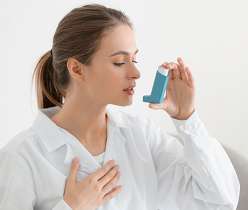Coronavirus infection is especially dangerous for patients with chronic respiratory diseases, including asthma patients. Viral diseases and the development of COVID-19 can exacerbate asthma symptoms and significantly impair patient health. SARS virus infects the lungs, which are the Achilles heel of asthmatics and allergy sufferers. If a person with asthma becomes infected with SARS-CoV-2, then he is at increased risk of severe COVID-19 with little chance of recovery.
Asthma Patient and Coronavirus
Asthma is an inflammatory process in the airways. Inflammation primarily affects the bronchi, which causes shortness of breath, wheezing, coughing, a feeling of constriction in the chest. Coronavirus, after entering the body, destroys the lung tissue and damages the alveoli. Therefore, for asthmatics, the lung attack doubles, and the consequences can be much more serious than for healthy people. The most vulnerable to coronavirus outbreaks are people with chronic lung disease. COVID19 infection causes symptoms such as coughing, fever and shortness of breath, which in patients with asthma can significantly undermine an already weak immune system. COVID 19 occurs as a flu-like respiratory illness but can be more severe in acute pneumonia, life-threatening respiratory failure, or multiple organ failure. The experience of Chinese doctors shows that after infection with SARS-CoV-2, asthmatics who received steroids daily suffered more than others. Therefore, such patients should monitor their safety better than healthy people, and strictly follow the instructions of the WHO, the Russian Ministry of Health, and the attending physician.
Coronavirus and Asthma Prevention
Since there is no vaccine against COVID-19 yet, asthma patients should take appropriate precautions more often so as not to become infected with the coronavirus. Patients who have asthma or are allergic are exposed to more severe effects of COVID-19; therefore, it is extremely important for them to regularly take care of themselves while taking medications prescribed by a doctor. In the event of a worsening condition, the appearance of shortness of breath, chest pain, and other symptoms of a coronavirus, you should immediately contact an ambulance. The most important measure is isolation and minimization of contacts with people. Therefore, asthmatics and allergy sufferers should stay at home; go out only when it is very necessary.
How to minimize the risk of Coronavirus Infection?
When you leave home, stay away from human contact. Try not to go to crowded places. When you need to shop, keep 2 meters distance. Wash your hands often with soap or alcohol-based
disinfectants. Avoid travelling by public transport. Stay home all day if possible. Recommendations for patients with asthma is following a treatment plan, do not stop taking medications – take them as directed. Carry your
inhaler with you so that you can respond when asthma symptoms appear. Be wary of antiseptic agents that can cause an allergy attack. Clean and sanitize surfaces that you often touch with your hands daily.
Consultation for Your Medications
The patient who has asthma is more likely to develop serious COVID-19 complications. There are various types of Inhalers are used to relieve symptoms of asthma and COPD such as coughing, wheezing, and feeling breathless. One of the inhalers indicated for asthma in adults is Ventolin Inhaler 100 mcg. Buy Ventolin online is for oral inhalation use only. ACAAI advises the asthma patients should consult their physician via telephone or video conferencing to maintain routine contact and appointments to avoid severe health complications.
Coping with Stress during COVID19 Outbreak
People are feeling stressed, puzzled, and nervous or annoyed in the time of COVID19 crisis, and it is quite normal. Having a telephonic conversation or chat with people you know personally can help you to get rid of this situation. Don’t forget to stay in touch with your family and closed ones and if possible, communicate with them daily. Enjoy your homestay and maintain a healthy lifestyle which includes the right amount of calories intake, proper sleep, and daily exercise and connect with your loved ones at home and by email or phone with friends or distant relatives. Don’t smoke or consume alcohol or other drugs to deal with your emotions. If you feel overwhelmed, contact your health counsellor.
Special Precautions during Home Stay
Staying at home and self-quarantining can pose challenges for people who have asthma. There is a rise in pollen counts during the spring season; windows also should be kept closed to reduce exposure. Lastly, be vigilant about any respiratory symptoms you experience — don’t take them lightly as “just” allergies or asthma.
Also Read: Can Diet Help to Manage Asthma?




